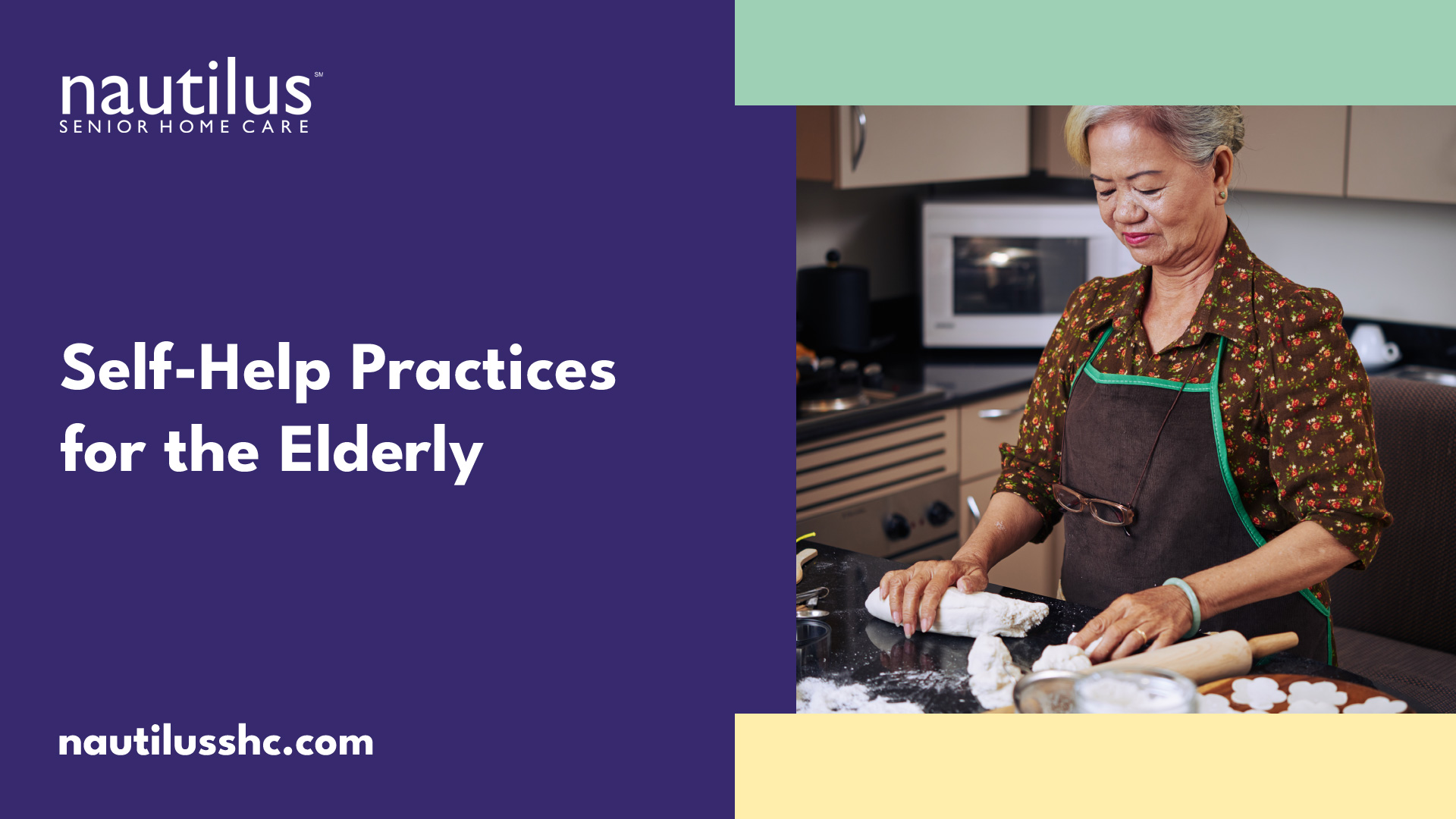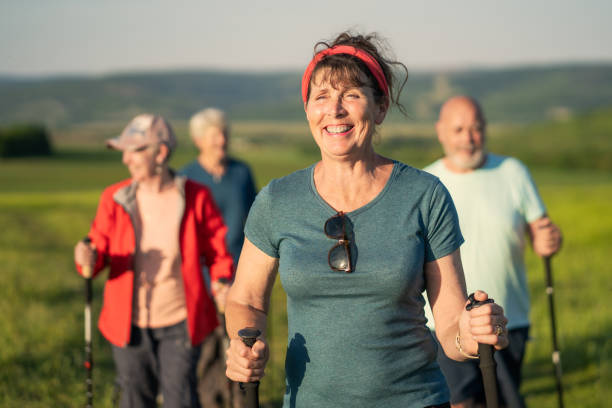Embracing Self-Help for the Elderly
Self-help practices play a vital role in enhancing the overall well-being and quality of life for the elderly. By actively engaging in self-help activities, seniors can maintain their physical and mental health, foster social connections, and find fulfillment in their daily lives. Let’s explore the importance of self-help for the elderly and the benefits it brings.

The Importance of Self-Help for the Elderly
Self-help empowers the elderly to take control of their own well-being and actively participate in their own care. It allows them to maintain a sense of independence, autonomy, and purpose in their lives. Self-help practices enable seniors to make choices that align with their values, preferences, and goals, promoting a sense of self-worth and personal fulfillment.
By embracing self-help, the elderly can also develop a greater sense of resilience and adaptability, allowing them to navigate the challenges that come with aging. It encourages them to take responsibility for their health, both physical and mental, and empowers them to make informed decisions about their lifestyle choices.
Benefits of Self-Help Practices
Engaging in self-help practices offers numerous benefits for the elderly, contributing to their overall well-being and quality of life. Here are some key advantages:
- Empowerment and Control: Self-help practices give seniors a sense of control over their own lives, fostering a greater sense of empowerment and self-confidence.
- Improved Physical Health: Self-help activities, such as staying active and maintaining a balanced diet, can improve physical health, enhance mobility, and reduce the risk of chronic conditions.
- Enhanced Mental Wellbeing: Engaging in cognitive stimulation, cultivating a positive mindset, and managing stress and anxiety through self-help practices can contribute to improved mental health and emotional well-being.
- Social Engagement: Self-help practices that focus on social connections help combat loneliness and isolation, promoting a sense of belonging and improved social support.
- Improved Cognitive Function: By participating in activities that stimulate the mind, such as lifelong learning, the elderly can maintain cognitive function and promote brain health.
- Sense of Purpose: Self-help practices involving hobbies and interests provide a sense of purpose and fulfillment, allowing seniors to continue pursuing activities they enjoy.
By embracing self-help practices, the elderly can actively shape their lives and experience the numerous benefits it offers. From physical well-being to mental and emotional health, self-help empowers seniors to lead vibrant and fulfilling lives as they age.
Physical Wellbeing
Maintaining physical wellbeing is crucial for enhancing the overall health and quality of life for the elderly. By incorporating self-help practices into their daily routines, seniors can experience improved functionality, increased energy levels, and a greater sense of independence. In this section, we will explore three key aspects of physical wellbeing: staying active and engaged, incorporating exercise into daily routines, and maintaining a balanced diet.
Staying Active and Engaged
Staying active and engaged is essential for promoting physical and mental health in the elderly. Regular physical activity helps to improve mobility, strengthen muscles, and enhance cardiovascular health. Engaging in activities that are enjoyable and meaningful can also provide a sense of purpose and fulfillment.
Physical Activities and Benefits
Walking: Improves cardiovascular health, strengthens muscles, and promotes joint flexibility.
Swimming: Provides a low-impact workout that is gentle on the joints and improves overall body strength.
Yoga: Enhances flexibility, balance, and promotes relaxation and stress reduction.
Dancing: Increases cardiovascular fitness, improves coordination, and uplifts mood.
Incorporating Exercise into Daily Routine
Incorporating exercise into the daily routine is an effective way for seniors to maintain their physical wellbeing. It’s important to choose activities that are appropriate for their fitness level and interests. Regular exercise can help prevent chronic conditions, improve bone density, and boost overall strength and flexibility.
Exercise Types and Benefits
Strength Training: Builds muscle mass, improves bone density, and increases overall strength and stability.
Aerobic Exercises: Enhances cardiovascular health, burns calories, and improves stamina and endurance.
Flexibility Exercises: Increases joint range of motion, improves posture, and reduces the risk of injury.
Balance Exercises: Enhances stability, reduces the risk of falls, and improves overall coordination.
Maintaining a Balanced Diet
Maintaining a balanced diet is crucial for overall health and wellbeing, regardless of age. As individuals grow older, their nutritional needs may change, and it’s important to adapt the diet accordingly. A balanced diet should include a variety of fruits, vegetables, whole grains, lean proteins, and healthy fats. Adequate hydration is also essential for optimal physical functioning.
Nutrients and Importance
Fiber: Supports digestion, reduces the risk of constipation, and maintains bowel regularity.
Calcium: Promotes bone health and helps prevent osteoporosis and fractures.
Protein: Supports muscle strength, aids in tissue repair, and promotes immune function.
Omega-3 Fatty Acids: Reduces inflammation, supports heart health, and promotes brain function.
By prioritizing physical wellbeing through staying active and engaged, incorporating exercise into daily routines, and maintaining a balanced diet, seniors can enjoy a higher quality of life. It’s important to consult with healthcare professionals and nutritionists to develop personalized plans that cater to individual needs and limitations.
Mental and Emotional Wellbeing
Maintaining mental and emotional wellbeing is vital for overall health, especially as we age. Self-help practices can play a significant role in promoting a positive mindset, cognitive stimulation, and managing stress and anxiety. Let’s explore these aspects further.
Cultivating a Positive Mindset
Cultivating a positive mindset is essential for mental and emotional wellbeing. It involves focusing on gratitude, optimism, and self-compassion. Engaging in activities such as journaling, practicing mindfulness, and surrounding oneself with positive influences can contribute to a more positive outlook on life.
Engaging in Cognitive Stimulation
Keeping the mind active and engaged is crucial for mental wellbeing. Engaging in cognitive stimulation exercises can help maintain cognitive function and promote brain health. This can include activities such as puzzles, reading, learning new skills, or participating in brain-training exercises.
Cognitive Stimulation Activities
- Puzzles (crosswords, Sudoku)
- Reading
- Learning a new language
- Playing musical instruments
- Brain-training apps and games
Managing Stress and Anxiety
Stress and anxiety can have a significant impact on mental and emotional wellbeing. Self-help practices can help manage and reduce stress levels. Techniques such as deep breathing exercises, meditation, practicing relaxation techniques, and pursuing hobbies can contribute to stress reduction.
It’s important to find the strategies that work best for each individual when managing stress and anxiety. Experimenting with different approaches can help identify the most effective techniques for personal stress management.
By cultivating a positive mindset, engaging in cognitive stimulation, and effectively managing stress and anxiety, older adults can enhance their mental and emotional wellbeing. These self-help practices contribute to a more fulfilling and satisfying life in the later years.
Social Connections
Maintaining social connections is crucial for the overall well-being of the elderly. Engaging in social interactions, finding community and support, and fostering meaningful relationships can have a positive impact on their mental, emotional, and physical health.
Importance of Social Interactions
Social interactions play a vital role in combating feelings of loneliness and isolation among the elderly. Regular social engagement can provide a sense of belonging, purpose, and fulfillment in their lives. It also helps to reduce the risk of cognitive decline and mental health issues.
Finding Community and Support
Finding a community and support system is essential for the elderly to stay connected and engaged. Here are some ways they can find community and support:
- Join local senior centers or clubs: These centers often offer a variety of activities, classes, and social events specifically designed for older adults.
- Participate in group activities: Engaging in group activities such as exercise classes, book clubs, or hobby groups can help the elderly meet like-minded individuals and foster new friendships.
- Volunteer: Volunteering provides an opportunity to give back to the community while also meeting new people who share similar interests and values.
Engaging in Meaningful Relationships
Building and nurturing meaningful relationships is vital for the well-being of the elderly. Meaningful relationships can provide emotional support, companionship, and a sense of purpose. Here are some ways they can engage in meaningful relationships:
- Stay connected with family and friends: Regularly reaching out to loved ones through phone calls, video chats, or in-person visits can help maintain strong bonds.
- Foster new connections: Participate in social activities and events where they can meet new people and form new friendships.
- Join support groups: Support groups provide a safe space to connect with others who are going through similar experiences and challenges.
By prioritizing social interactions, finding community and support, and engaging in meaningful relationships, the elderly can enhance their overall well-being and quality of life. It’s important to encourage and facilitate these connections to ensure that they remain socially connected and supported throughout their aging journey.
Enhancing Life with Hobbies and Interests
Engaging in hobbies and pursuing personal interests can greatly enhance the quality of life for the elderly. These activities provide a sense of purpose, fulfillment, and enjoyment. In this section, we will explore the importance of exploring new hobbies and interests, rediscovering old passions, and continuing lifelong learning.
Exploring New Hobbies and Interests
Exploring new hobbies and interests can open doors to new experiences and foster personal growth. It’s never too late to try something new! Here are a few ideas for hobbies and interests that the elderly can explore:
Hobby/Interest and Description
Gardening: Cultivate a green thumb and enjoy the beauty of nature.
Painting or Drawing: Unleash your creativity and express yourself through art.
Photography: Capture precious moments and explore the world through the lens.
Cooking or Baking: Experiment with new recipes and savor the joy of culinary creations.
Dancing: Get moving and have fun while improving physical fitness.
Playing Musical Instruments: Stimulate the mind and express emotions through music.
Remember, the key is to choose activities that bring joy and a sense of accomplishment. Don’t be afraid to step out of your comfort zone and try something completely new!
Rediscovering Old Passions
For many elderly individuals, there may be passions and interests from the past that have been neglected or put on hold. Rediscovering these old passions can reignite a sense of purpose and provide a nostalgic connection to cherished memories. Here are a few examples:
Passion and Description
Reading: Dive into books and explore new worlds through literature.
Crafts and DIY Projects: Rekindle your creativity and engage in hands-on projects.
Sports or Outdoor Activities: Rediscover the joy of playing a favorite sport or exploring the outdoors.
Writing: Express yourself through writing, whether it’s journaling, storytelling, or poetry.
Volunteering: Give back to the community and make a positive impact through volunteering.
Reconnecting with old passions can bring a renewed sense of purpose and fulfillment, allowing the elderly to tap into their unique talents and interests.
Continuing Lifelong Learning
Learning should never stop, regardless of age. Lifelong learning keeps the mind sharp, promotes personal growth, and fosters a sense of accomplishment. Here are some ways the elderly can continue their learning journey:
Learning Opportunity and Description
Online Courses: Explore a wide range of subjects through online platforms and educational websites.
Book Clubs: Engage in intellectual discussions and connect with others who share similar interests.
Language Learning: Challenge yourself to learn a new language and expand your cultural horizons.
Educational Workshops: Attend workshops and seminars to gain new skills and knowledge.TED Talks and PodcastsTune in to thought-provoking talks and podcasts on various topics of interest.
Continuing to learn and acquire new knowledge can invigorate the mind, boost self-confidence, and provide a sense of accomplishment.
By exploring new hobbies, rediscovering old passions, and continuing lifelong learning, the elderly can add vibrancy and fulfillment to their lives. These activities not only bring joy but also contribute to overall mental, emotional, and social well-being. Embrace the opportunity to explore and pursue personal interests, and let them enrich your life in meaningful ways.
Seeking Support and Resources
In the journey of self-help for the elderly, seeking support and utilizing available resources can greatly enhance their well-being. It’s important to recognize that professional help, technology, and support networks can play a vital role in providing assistance and guidance. Let’s explore these avenues of support further.
Accessing Professional Help
Professional help can provide valuable expertise and guidance tailored to the unique needs of the elderly. Various professionals, such as therapists, counselors, and healthcare providers, can offer support in different aspects of their lives. Here are some areas where professional help can be beneficial:
Professional Help and Areas of Support
Therapists: Emotional well-being, grief counseling, mental health
Counselors: Career guidance, life transitions, relationship issues
Healthcare Providers: Physical health, chronic condition management, medication management
By seeking professional help, seniors can receive specialized care and assistance to address any challenges they may be facing.
Utilizing Technology for Self-Help
Technology has become an integral part of our lives, and it can greatly benefit the elderly in their self-help journey. Here are some ways in which technology can be utilized:
Technology for Self-Help and Benefits
Mobile Applications: Access to meditation apps, fitness trackers, brain training games
Online Learning Platforms: Engaging in courses, acquiring new skills, staying mentally active
Telehealth Services: Remote consultations with healthcare professionals, access to medical advice
Technology can enhance accessibility and convenience, empowering seniors to take control of their well-being and access resources from the comfort of their own homes.
Connecting with Support Networks
Social connections and support networks are essential for the elderly to feel a sense of belonging and receive emotional support. Here are some ways to connect with support networks:
Support Networks and Benefits
Community Centers: Engaging in activities, socializing, accessing resources
Senior Clubs/Organizations: Connecting with peers, participating in group activities
Online Communities: Joining forums, discussion groups, and social media platforms for seniors
By connecting with support networks, seniors can build relationships, share experiences, and find comfort in a community that understands their unique needs.
Seeking support and utilizing available resources can significantly enhance the self-help journey for the elderly. Through professional help, technology, and support networks, seniors can access the guidance, assistance, and connection they need to thrive in their later years.
Sources
Twelve Self-Care Tips for Seniors
10 Self-Care Activities for Seniors for Health and Happiness



